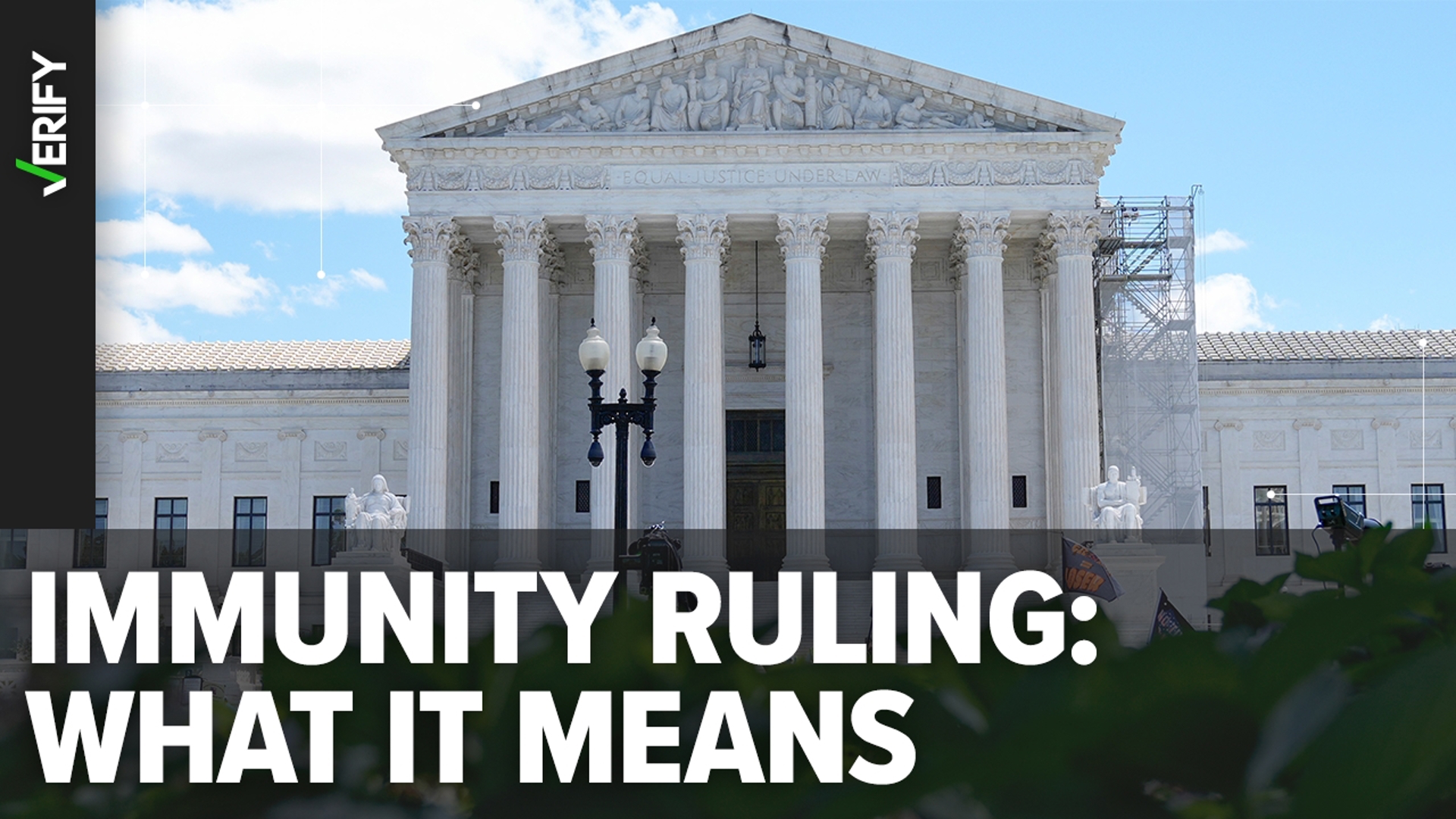In the most anticipated ruling of the year, the Supreme Court decided Donald Trump has some immunity from criminal prosecution for official actions he took as president.
The 6-3 ruling complicates the ongoing case against Trump for his actions to overturn the results of the 2020 election.
Critics of the ruling, including President Joe Biden, argued it turns presidents into “kings” who are above the law.
Numerous VERIFY readers sent in questions about the ruling, asking what kind of precedent it sets for current and future presidents.
THE SOURCES
Trump v. United States, ruling by Chief Justice John Roberts
Trump v. United States, dissent by Justice Sonia Sotomayor
Kimberly Wehle, Professor of Law at the University of Baltimore
QUESTION #1
Does the decision also give immunity to President Biden?
THE ANSWER
Yes, the ruling applies to all presidents.
WHAT WE FOUND
The decision’s wording makes it clear that the ruling applies to all presidents, no matter when they were in office.
In its ruling, the Supreme Court created a new doctrine of “absolute immunity” for official acts related to the president’s core constitutional duties, and “presumptive immunity” for all other official acts by the president.
Chief Justice John Roberts argued without such immunity, presidents may not take “bold and unhesitating action” when required, out of fear they could be prosecuted after leaving office. He explained that “presumptive immunity” means prosecutors would have to prove that charging a president for a particular action would not have such a chilling effect on future presidents.
Meaning, the ruling intentionally applies to former, current, and future presidents.
The crux of the decision read: “Under our constitutional structure of separated powers, the nature of Presidential power entitles a former President to absolute immunity from criminal prosecution for actions within his conclusive and preclusive constitutional authority. And he is entitled to at least presumptive immunity from prosecution for all his official acts. There is no immunity for unofficial acts.”
By referring to “a” former president instead of “the” former president, Roberts made it clear the ruling is not specific to Trump’s case, but instead establishes a broad immunity for all presidents.
QUESTION #2
Does the decision give the president unlimited powers? For instance, could President Biden postpone the election or bring back Roe v. Wade?
THE ANSWER
No, giving the president immunity from criminal prosecution isn’t the same thing as giving him unlimited new constitutional powers.
WHAT WE FOUND
The decision gives presidents broad immunity from criminal prosecution, which means they can’t be charged for official actions they took as president. It doesn’t make previously impossible actions possible.
For instance, the ruling doesn’t give presidents control over elections, because elections are run primarily by the states. If the president tried to order states to postpone the election, there’s nothing in the Supreme Court ruling that would require the states to comply.
Similarly, in its Dobbs decision that overturned Roe v. Wade, the Supreme Court gave states the power to decide abortion laws. If the president declared a nationwide right to abortion, there’s nothing in the ruling that says the states would have to listen to him.
And the president couldn’t start writing or amending new federal laws on his own. Congress still controls the legislative process and is under no new obligation to obey the president.
QUESTION #3
Can the president now order the military to assassinate his political opponents?
THE ANSWER
The ruling did not specifically answer the hypothetical question, which was brought up repeatedly during oral arguments. Specific actions like this would likely have to be judged by the courts on a case-by-case basis.
WHAT WE FOUND
The ruling gives the president absolute immunity for official actions related to his core constitutional powers. The Constitution declares the president to be the commander-in-chief, making military action an official constitutional duty.
Justice Sonia Sotomayor specifically argued in her dissent that the precedent now established by the Supreme Court effectively allows the president to order the military to target his political opponents.
“When [the president] uses his official powers in any way, under the majority’s reasoning, he now will be insulated from criminal prosecution,” Sotomayor wrote. “Orders the Navy’s Seal Team 6 to assassinate a political rival? Immune. Organizes a military coup to hold onto power? Immune.”
But Chief Justice John Roberts said “the dissents… strike a tone of chilling doom that is wholly disproportionate to what the Court actually does today” and accused them of “fear mongering on the basis of extreme hypotheticals.”
However, Roberts does not specifically address the assassination question or explain how the ruling would prevent it.
“I think that’s just rhetoric, right? He doesn’t give any reason,” said Kimberly Wehle, a professor of law at the University of Baltimore. “If… taking steps to overturn an election, if that is in their mind not serious enough to automatically go in the category of ‘unofficial,’ what is left?”
The question could only be answered with certainty if a president attempted political assassination, was caught doing so and was charged for it, and then claimed immunity – at which point the courts would have to rule on the matter.
“The question now is what are the consequences, or fear of consequences, for presidents commit[ting] crimes in the White House? I don't see where it is other than self restraint,” said Wehle.
This story is also available in Spanish / Lee este artículo también en español: Lo que la sentencia de inmunidad de la Corte Suprema podría significar para Biden y futuros presidentes

